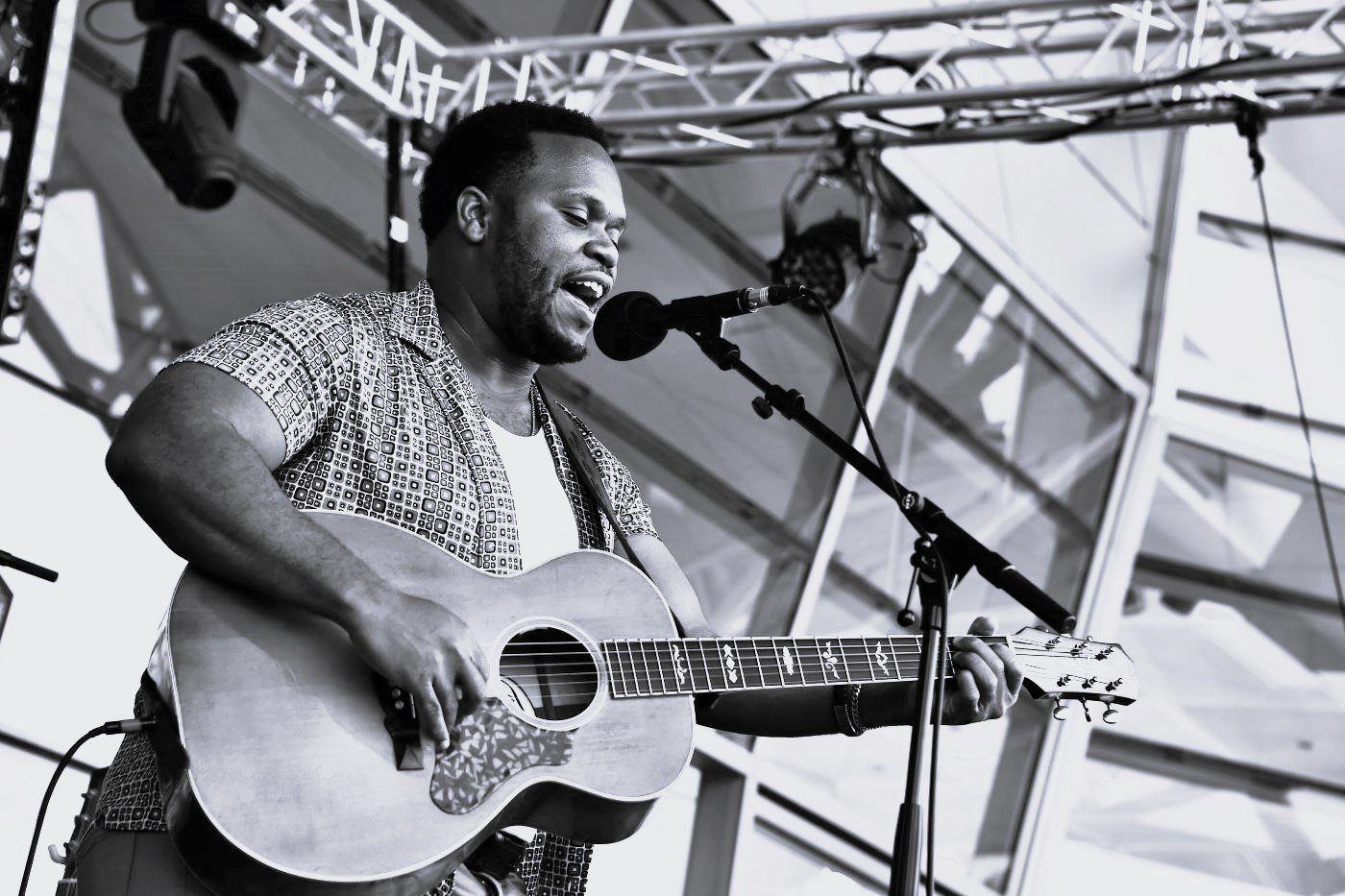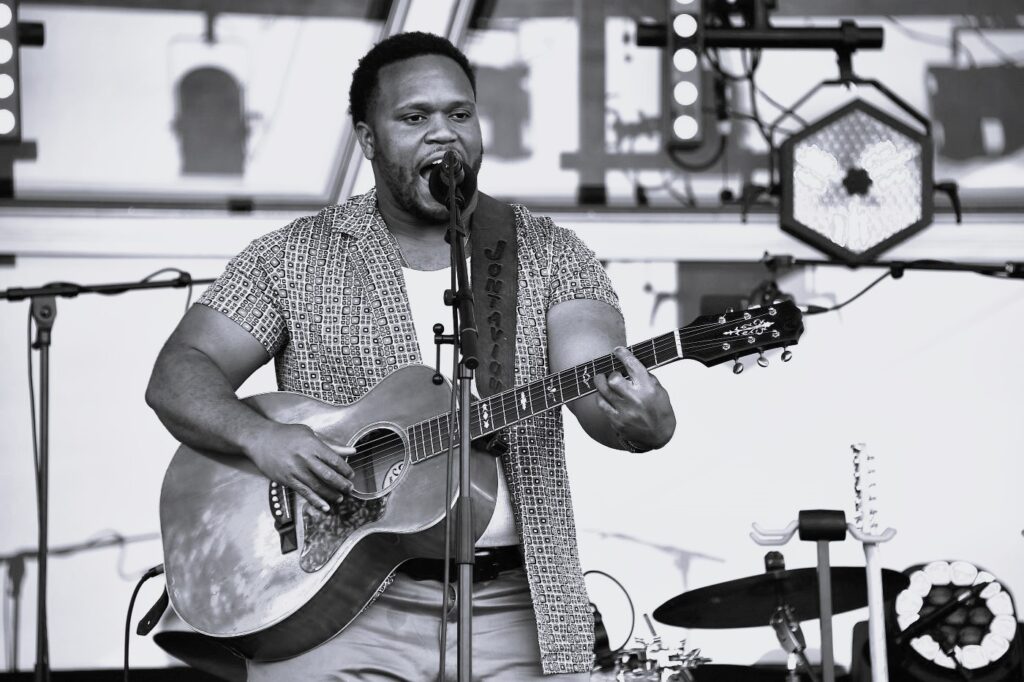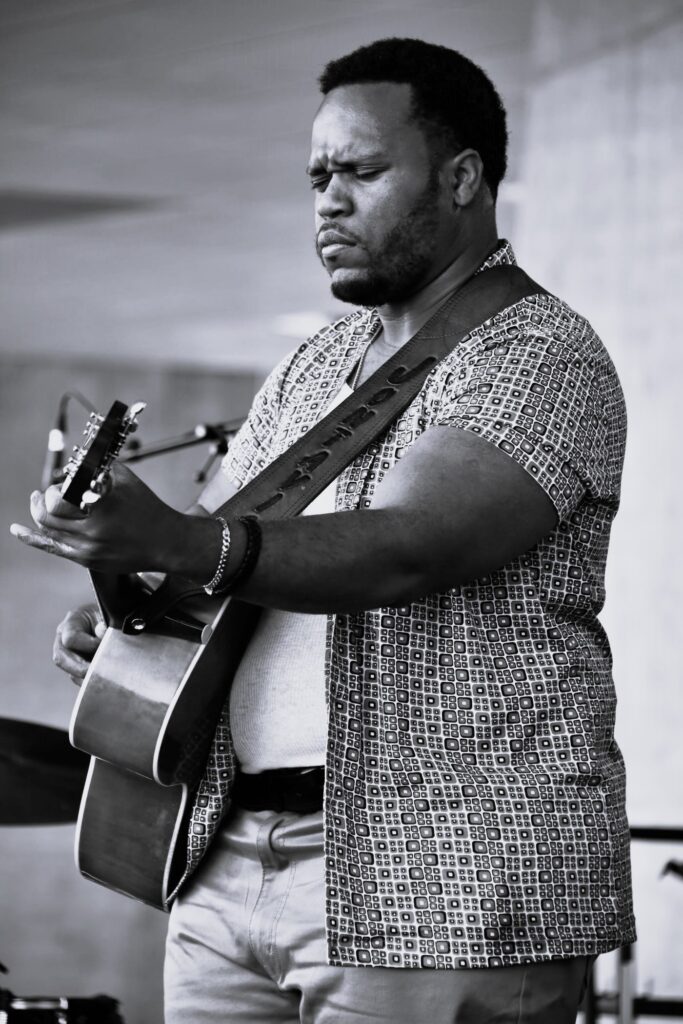Goin’ Down Rhône River
by Philippe Prétet
23/06/2023. In Lyon, France, a narrow strip of land marks the confluence between the Rhône and the Saône, the two rivers running through the ancient capital of the Gauls. The Musés Des Confluences, built at that intersection, has organized a fascinating temporary exposition under the title “Nous les fleuves” (We the rivers). It is in that context that Jontavious Willis has been invited as a musician to play on the banks of an imaginary river. Though he has just landed after a long flight from Atlanta, Georgia, and struggling to retrieve his luggage, Jontavious “Quon” Willis accepts right away to do our interview for Il Blues. The guy is humble, affable and he shows an unparelleled kindness, just typical of the southern people. At age 27, he was born in 1996 in Greenville, Georgia, he’s really a passionate student and historian of the blues.
He speaks with love and respect about musicians like Blind Willie McTell, Barbecue Bob, Kokomo Arnold, Ma Rainey, all from his native Georgia, a cultural legacy he would like to see highlightened today. He’s very proud of his rural roots and he’s simply reclaiming that. Unexpectedly, Jontavious shows us on his telephone, with a big smile, the hogs he raises in his farm. Self-thaught, he is an adept of the acoustic guitar, he uses it to play songs from the Twenties to the Fifties he loves so much, creating his own melodic lines rather than replicating the originals and interpreting them with a fingerpicking style he masters to perfection.
A fine lyricist, composer and interpreter, he is at the forefront of the new generation of artists firmly inscribed in the traditions of Piedmont blues, gospel, country blues, Delta blues…After the interview, Jontavious tells us the blues is one of his favorite subjects, because it highlights african-americans from different regions of the US, singing about different topics with a broad spectrum o of languages, styles and influences. Furthermore, a large part of its history mirrors that of his own family, as well as many other black households, he says. He’s convinced that the blues and its vernacular language, runs through the secular and the sacred side of music, the great migration, the civil rights movement, sharecropping…and much more. Jontavious is impressive for his personality, it comes from his experience and it shows his emotional intelligence and the depth of his soul. He happily shares details about his next record, it’s gonna be his third after the excellent “Blue Metamorphosis” (2016) and “Spectacular Class”(2019). The real deal ! That’s how he is being referred to by his fans, the media and his musicians friends. A safe bet ? Indeed, it’s a given.
Interview with Jontavious Willis
Taj Mahal called you a wonderboy, a wunderkind. Has this changed anything for you?
I think Taj Mahal took me from a smaller stage to a bigger stage and also he ended up being like a mentor of source, as far as the historical aspects of the blues. Not necessarily of playing, nobody or not many folks really showed me how to play, I learned mostly on my own. But he thaught me a lot about history and kind of connected the dots…him and my grandmother are born in the same year. So I see him as an elder, even though my grandfather is a little older than him. I think it changed the way I view the music industry, the way I view music and the way I interact with my contemporaries, based on the career that Taj Mahal has had and the one he’s having. Just the information he has. He changed my inside a lot. I met him 8 years ago, I was about eighteen or nineteenth, early on in my careeer. He introduced me to Keb’ Mo’.
You have a huge musical culture and many references in your two albums which sound great with great musicality as well. Groove, soulfulness, fingerpicking or flatpicking and slide guitar are all elements that seem to play an important role in your music.
It depends from what I chose to play. Those are the sounds that I like and that I go after. I’ve always loved the sound of fingerpicking. I’m not a big flatpicker, I can flatpick a little bit but not like I fingerpick. I fingerpick real good, I play good slide, a little harmonica, a little banjo…those are the sounds I like and being from the country, Georgia, those are the similar sounds you hear in church or your hear people talk. Every aspect of life kinda comes out with those sounds.
You wrote all the lyrics for your second album, “Spectacular Class”, a mix of Delta Blues, Country blues, Ragtime, Piedmont and Texas blues, with a touch of gospel. Does this mean that you draw on the roots of traditional blues that you want to perpetuate in your songs?
I definitely want traditional gospel and traditional blues in every song…some are a little different because I got other influences, but most of them are traditional music. Let me show you, if I hit shuffle you see…Big Joe Williams, Amos Milburn, T-Bone…When you say blues it’s just so many, you got the vocal blues, the ragtime blues, the jug band blues, the classic female singing blues, solo blues, two guitar blues…it’s so many. You can hear so many sounds. Even somebody like Joe Pullum, who sings “Black Gal” and sounds like R&B. So yes, I definitely try to have the roots, the southern feeling, regardless if it sounds more modern or old school, I still want that southern thing.
You’re a true enthusiast who plays acoustic blues at a time when many young African-american musicians prefer electric guitar and showmanship. Why not take the easy way out?
Ah man…I would not say the easy way out! I’ve just found what I’m good at. I play electric sometime, but even when I play electric I’m not a showman, not in the sense of showing technicality…I know a lot of songs, I know about the lyrics, I’ve got my own picking patterns…not necessarily like Guitar Slim. I love the blues from the Twenties to the Fifties, that’s the most original time. I like solo because it’s easier to play by yourself, you know what I’m saying? It gets kind of complicated when you play with other people, you have to be the leader. Being in the country I started playing with a friend who plays drums but we ended up splitting. I play with two guitars sometime and I still play electric guitar but country blues is where my heart is.
What about your friend Andrew Alli, both of you seem to have a similar feeling for music.
Andrew is a good friend of mine. He listens to a lot of old stuff too. He’s real tasteful with the harmonica. He’s a good singer and he’s good player, he plays good guitar too. He thaught me some Big Bill Broonzy stuff. I love Andrew.
Any new recording project?
Yes, I’ve been to the studio and recorded a few dozens songs since I put out “Spectacular Class”, but I’m just trying to find the right channel to put it out. And also I want it to be more intentional. Opposed to “Spectacular Class”, a lot the guys, the musicians, I didn’t know them. These folks I know, they are people I play with, so it’s gonna be more straight for me. I did not the players in 2019. Now I know the piano player, I know the bass player… Also I did not know how each song was gonna sound, how I wanted to orchestrate it. It takes time.
I’m gonna see a new audience tonight, for them “Spectacular Class” is new, but you’ve been following me and you know it’s four years old. The blues world is so small I want to make sure there’s space in between, so you can hear the growth. I don’t want to put out an album every year, especially when I’m still touring. This year I’m recording and next year I’ll release good songs that will show better songwriting, better playing, better organization skills.
What would you do if you were not playing the blues?
Oh I’d be sad, for sure! I’d be talking about it if I were not playing it. I do some workshops, I really love history. When I was twelve years old I started listening to blues and to really enjoy the history. I feel like there was a time in american history when black folks were making some of the best stuff ever that really revolutionize the way people see music. So I teach a lot of Georgia blues, because a lot of people don’t talk about Blind Willie McTell, Barbecue Bob, Kokomo Arnold, Ma Rainey…Being from Georgia. A lot more people talk about Mississippi, but there’s a lot of great musicians from Georgia. So I’d be either teaching or on the farm raising pigs, because I like that… let me show you, I got a few of them hogs. I like agriculture, my grandaddy was a farmer. It’s all still related to the blues.
This morning I listened to your song, “The World Is In A Tangle”. You’re referring to something that was happening in the USA and you would want to move to another country for that?
Just away from to world, not necessarily away from the USA: At the time I wrote the song because there was a school shooting…that was the genesis for the song. Bigger picture I was meaning to get away from humans, get away from trouble, in a foreign land. Like go to Mars or something like that. The title comes from another song from Roosevelt Sykes. He had a song in 1929 “All My Money’s Gone” and there is a line that goes,, “…the world is in a tangle, everybody is singing this song”. Then later Jimmy Rogers and others used that line too.
(With many thanks to Mr. Philippe Krumm Director of the Musée des Confluences in Lyon, Rhône)














Comments are closed